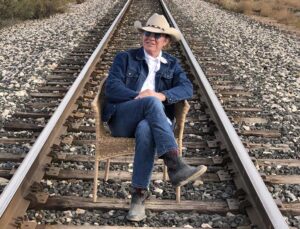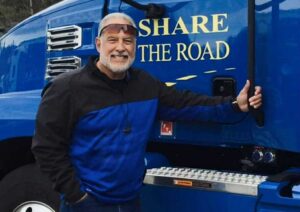Of the countless miles I spent in the back seat of a Chevy station wagon, traveling along the interstates of America during the 1970s, I recall four things in particular — roadside litter, country music on the radio, big trucks and hitchhikers.
Thanks to a PSA featuring a crying Native American, the litter pretty much disappeared by the mid-70s. Country music and big trucks remain a staple to this day. And hitchhikers … well, they are an endangered species some 50 years later.
There was a day when hitchhikers shared the nation’s highways with vehicles of all sorts, and no one gave it much thought. Those hoping for a ride came in all forms — college kids, locals who didn’t want to walk a mile to the store, and cross-country trekkers with no real destination in mind. All held out their thumbs and signs to show those passing in luxury that they’d sure appreciate a ride.
Things were different in the ’70s. A lift was gladly offered by a passing driver and genuinely appreciated by the hitchhiker. At some point, that aspect of hitchhiking changed. Today, for the protection of both the driver and the thumber, hitchhikers are an endangered species, if not outright illegal.
While it may be a rarity today, in its time, hitchhiking was a ritual of sorts in the ’70s. Countless country songs have been recorded about the practice, both from the point of view of truck drivers (the most generous of motorists) or from those begging for a lift.
In fact, country music road songs have kept the spirit of hitchhiking alive for decades.
Tunes about those walking along the roadsides have been around since the earliest days of country music. The list of songs about the subject is almost too lengthy to fathom.
Starting in the 1960s, Kris Kristofferson wrote and recorded “Me and Bobby McGee,” the quintessential song of a couple on the road who were fortunate enough to catch a ride with a truck driver. In “Smoky Mountain Rain,” Ronnie Milsap did the same, and Charley Pride tried his hardest in “Is Anybody Going to San Antone?” And who can forget Red Sovine’s ride one cold, rainy night in “Phantom 309”?
Yes, country singers have spent a lot of time sharing the cab with a bunch of unknown truck drivers.
Perhaps hitchhiking is so popular in country music because it can fit into two of country’s sub-genres — trucking songs and road songs. In so many country tunes, trucking and road themes blend, often making it hard to distinguish between the two. In fact, even when a truck isn’t mentioned, road songs typically conjure up images of a generous truck driver somewhere in the background.
Ricky Skaggs’ 1983 No. 1 hit “Highway 40 Blues” is just one song with lyrics that can’t help but offer the roar of an 18-wheeler in the background.
In the years since the song’s release, Skaggs has mentioned that most listeners interpret “Highway 40” as Interstate 40, the road that stretches coast to coast across the southern tier of the U.S. The reality, Skaggs says, is that Highway 40 is simply a roadway in Skaggs’ home state of Kentucky.
After all, by 1983, interstate hitchhikers were becoming rare. But “Highway 40 Blues” offers no clue about the time frame; someone could have recorded the song any time over the past century, and it would have the same meaning.
It doesn’t take long for Skaggs to establish a theme in “Highway 40 Blues.” The second line, “I’ve walked holes in both my shoes,” defines the tune as a road song. Images of 18-wheelers are already in listeners’ minds.
The narrator then tells us he’s been away from home a long while — long enough to waste time, money and youth searching for whatever dream he’s been chasing. Regardless, he lets us know the effort wasn’t worth the means, admitting, “In the end I had to lose.”
As in most road songs, the narrator in “Highway 40 Blues” hits the road with big dreams. The lure of the highway is too much for a young man to resist. It tells “lies of things to come,” and billboard lights shine on fame and fortune just waiting to be had.
And, like so many other singers, Skaggs reveals that those billboards don’t always tell the truth. His “shattered dreams” have led to a numb mind. His money is lost. So, he does what many walkers of the highway did for decades: He stuck out his thumb. Like so many others, he’s realized that the only place he belongs is home. But for the narrator of “Highway 40 Blues,” the urge to return home has been slow coming.
Over the years, the narrator has “rambled all around, like a rolling stone from town to town.” He’s had more than one relationship with a pretty girl, but none were pretty enough to hold on to him. But he’s not always been down and out. He’s made a few bucks playing music halls and bars and pretended to be something he wasn’t by wearing fancy clothes and driving nice cars.
Still, he can’t escape the fact that he’s just a country boy … and country boys don’t need any of the things he thought would satisfy him in life. That’s the theme of “Highway 40 Blues,” or as to quote other Ricky Skaggs’ songs, “Don’t Get Above Your Raising” and “I’m Just a Country Boy at Heart.”
Until next time, keep to the left of the white line. You never know what might be lurking along the shoulder.
Since retiring from a career as an outdoor recreation professional from the State of Arkansas, Kris Rutherford has worked as a freelance writer and, with his wife, owns and publishes a small Northeast Texas newspaper, The Roxton Progress. Kris has worked as a ghostwriter and editor and has authored seven books of his own. He became interested in the trucking industry as a child in the 1970s when his family traveled the interstates twice a year between their home in Maine and their native Texas. He has been a classic country music enthusiast since the age of nine when he developed a special interest in trucking songs.










